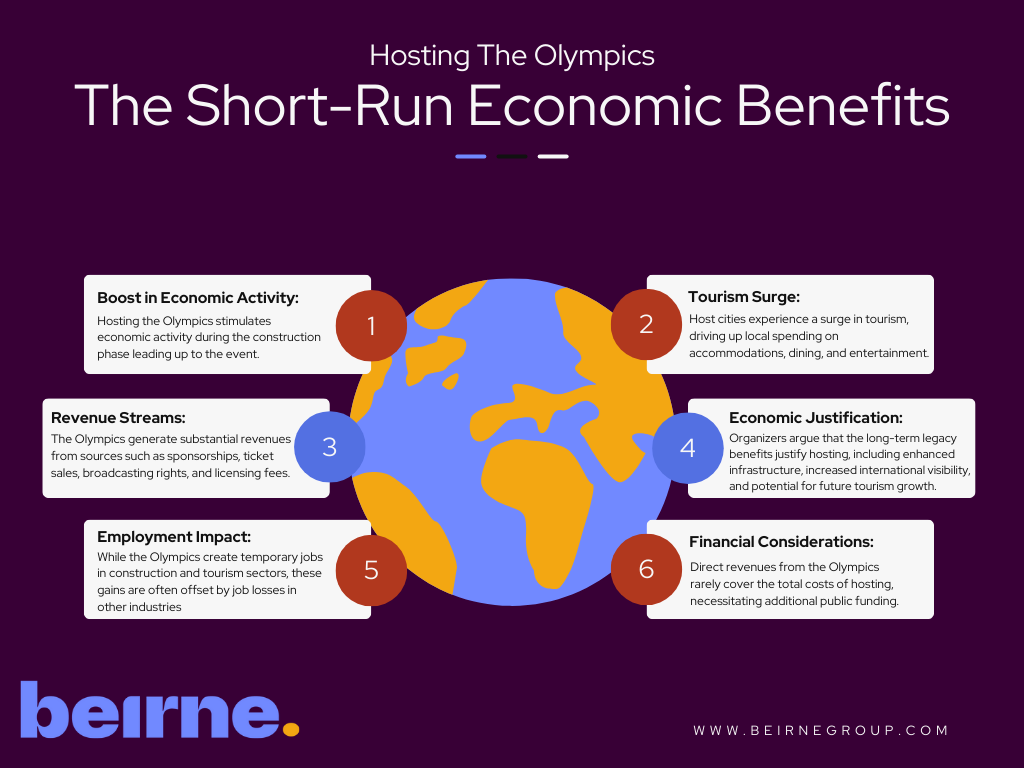
The Price of Glory: Costs and Benefits of Olympic Hosting
As the world turns its eyes toward Paris and the upcoming Olympic Games, nations will be celebrating their athletes and their many accomplishments. But for host cities, the games create a myriad of financial implications whose impacts go far beyond the games themselves.
We wanted to take a look at the costs, potential returns on investment (ROI), and the sustainability of hosting the Olympics. As host cities’ investments increase, revenue projections struggle to keep pace.1 So where does the money go?
Primary Costs of Hosting the Olympics
A lot of money gets funneled into hosting an international, high visibility event like the Olympics, funding a variety of initiatives:
1. General Infrastructure:
- Building and upgrading infrastructure such as roads, airports, and public transport systems.
- Housing for athletes and fans, which includes constructing Olympic Villages and other accommodations.
2.Sports Infrastructure:
- Upgrading or building new arenas and sports facilities.
- These facilities can later be used by local teams and for future events, potentially increasing sports attendance and community engagement.
3.Ceremonies:
The opening and closing ceremonies are significant costs but serve to uphold tradition and entertain global audiences. These are considered sunk costs, with no direct financial return.
Investment and Development
Hosting the Olympics is often seen as an investment in the city's future. The extensive development required can spur business growth and improve the quality of life for residents. However, the scale and efficacy of this investment vary greatly.1
1.Encouraging Business Development:
- New businesses may emerge to cater to the influx of tourists and the needs of the games.2
- Long-term economic growth can be stimulated by improved infrastructure and global visibility.2
2.Tourism Boost:
- Short-term tourist spending during the games can be substantial.2
- Long-term tourism benefits can occur if visitors are impressed by the host city and decide to return.2
3.Olympic Legacy:
- Long-term improvements in infrastructure.2
- Increased trade, investment, and tourism, known as the "Olympic legacy."2
- A sense of nationalism and pride, often referred to as the "feel-good effect."2
The Financial Reality
Despite these potential benefits, the financial reality of hosting the Olympics is often more complex. Costs frequently overrun initial budgets, and the expected economic benefits do not always materialize.
1.Security Costs:
- Security expenses alone for the Summer Olympics now exceed $1.5 billion beginning in 2004 in Greece.3
2.Cost Overruns:
- Between 1960 and 2016, the average Olympic Games experienced cost overruns of 156%.1 This level of overspend is almost unheard of in most other areas of business.
- Examples include Rio 2016 (initially budgeted at $3 billion but ended up costing around $13 billion) and Tokyo 2020 (initial budget of $7.3 billion rising to over $15.4 billion officially, with unofficial estimates exceeding $25 billion).1
3.Financial Losses:
- Sadly, many host cities do not see a positive return on investment. For instance, Beijing's 2008 Summer Olympics generated $3.6 billion in revenue against costs exceeding $40 billion . Similarly, London 2012 generated $5.2 billion compared to $18 billion in costs.1
4.Debt and Burden:
- The 1976 Montreal Olympics left the city with $1.5 billion in debt, taking nearly three decades to pay off.1
- Cities like Athens, Sochi, and Rio have faced similar financial burdens.1
Potential Solutions to Skyrocketing Costs
So those who love the spirit of the games and who also espouse a fiscally responsible mindset can examine alternative solutions to such levels of unsustainable spending:
1.Regional Hosting:
- Hosting the Olympics across multiple cities and broader regions could spread the financial burden, make greater use of existing infrastructure, and potentially contributing to increased ROI.1
2.Permanent Hosting Site:
- Some have suggested the idea of establishing a permanent site for the Olympics to eliminate the need for rebuilding infrastructure every few years. This could potentially contribute to a more enduring legacy of professional within the community which might further reduce costs over time.1
3.Using Existing Facilities:
- Los Angeles’ successful 1984 Summer Olympics serve as a model, where the city used existing facilities and ended with a $215 million operating surplus.1
While hosting the Olympics bring intangible benefits like national pride and international recognition, they frequently fail to deliver a positive financial return for the cities and countries who open their communities to the games. And so the question remains: Is the cost of hosting the Olympics worth the benefit? While the answer varies, the trend suggests that without rethinking the model, hosting the Olympics may remain a financially risky proposition.
Research and insights contributed by Henry Idone. Graphic design by Joseph Malanga.
1 “Rescuing the Olympic Games From Their Own Success,” by Victor Matheson and Rob Baade, Finance and Development, July 2021
2 “Going for the Gold: The Economics of the Olympics,” by Robert A. Baade and Victor A. Matheson, Journal of Economic Perspectives, Vol. 30, No. 2, Spring 2016
3 “Cost of Maximum Security: $1.5 Billion,” by Greg Garber, ESPN, August 2004


